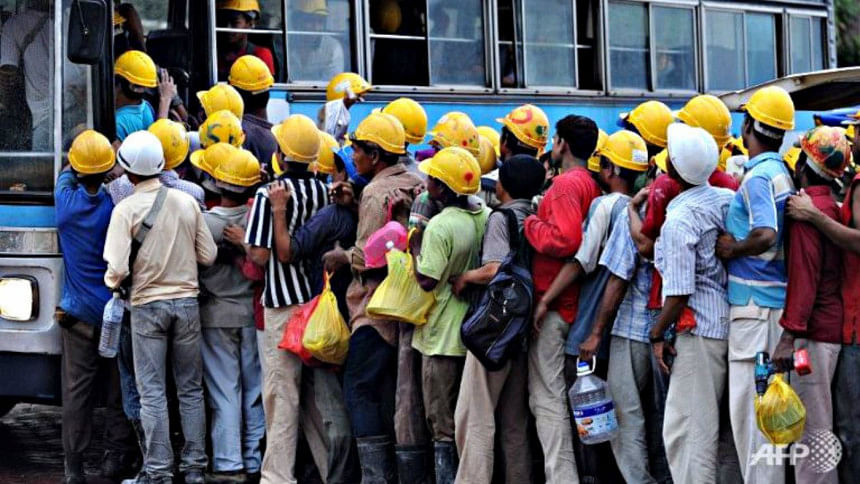Fewer risks, higher rewards

On December 18, 1990, the UN adopted the International Convention on the Protection of the Rights of All Migrant Workers and Members of Their Families. For the next decade, ASEAN civil society led the momentum for observance of this date as International Migrants Day. A day to bring to the forefront the human rights of migrants, to shed light on their contributions and make their voices heard.
This is a time to reflect on the progress made in protecting the rights of migrant workers in ASEAN and the challenges remaining in ensuring that their migration experiences are safe and beneficial.
The most recent UN estimates are that 20.2 million migrants originate from ASEAN countries, with nearly 6.9 million migrating to other countries within the region. The prosperity of entire economic sectors and geographic regions is heavily dependent on the output and earnings of these workers.
However, the rewards are unfairly and unequally shared by migrant workers, employers and recruiters, and governments. Low-skilled migrant workers comprise a large percentage of people on the move in ASEAN but remain highly vulnerable to abuse and exploitation. Women migrants are particularly susceptible to these risks due to undervaluing of "women's work" and lack of labour protection in the jobs available to them.
A joint study* released by ILO and IOM for International Migrants Day calls for further action to make labour migration fairer and enhance its contribution to inclusive and sustainable growth and development in the ASEAN region. To establish a baseline from which to measure progress towards these goals, the study developed the Migration Outcomes Index. The Index broadens the way migration outcomes are measured by balancing social and economic concerns instead of narrowly focusing on the scale of financial remittances received.
Based upon the results, the report proposes several key changes to labour migration governance within ASEAN countries.
First, shift the costs paid for recruitment from workers to employers. Migrant workers help to grow crops, manufacture goods, build homes and infrastructure, and provide services that are essential to people's lives in the region and worldwide. This movement is facilitated by recruitment agencies and brokers who regularly charge excessive fees to migrant workers. In other words, the current model of international labour recruitment is largely based on exploitation of workers, which is unfair considering the critical role that migrant workers play in filling labour shortages. Decent jobs should not be for sale.
The ILO/IOM survey found that 73 percent of workers going to Malaysia had borrowed money to pay for migration, working on average for a whole year to repay the loan. Growing recognition of the "employer pays" model and action by governments and businesses globally and regionally is a promising trend. International benchmarks on ethical recruitment that guide and support this change are reflected in the General Principles and Operational Guidelines for Fair Recruitment formulated by the ILO, along with governments, workers and employers' representatives and the International Recruitment Integrity System (IRIS) developed by the IOM and a multi-stakeholder coalition.
Secondly, enhance access of all low-skilled workers, but especially migrants, to skills recognitions and skills training that matches employer needs. Building partnerships between employers and training institutions in countries of origin and destination is essential to develop market-driven curricula that benefit national and migrant workers and businesses. Increasing skills development and validation would further diversify and strengthen the economic contribution of migrant workers.
Thirdly, ensure that women and men migrant workers are fully covered by labour and social protection laws, regardless of their jobs, and can access justice and remedies for abuse. Currently, many migrant workers are employed in sectors that offer limited protection, especially for those working in the informal economy. Introducing effective legal and institutional provisions for protection of labour and human rights of migrant workers will enhance their gains from migration, as well as prevent a race to the bottom on working conditions in destination country labour markets. The recently adopted ASEAN Consensus on the Protection and Promotion of the Rights of Migrant Workers and its forthcoming plan of action can enhance regional cooperation on this issue.
At present, migrant workers often have limited ability to control whether they have a positive or negative migration experience, regardless of the decisions they make. Decreasing the risks and increasing the rewards for migrant workers, their families and their communities requires changing the status quo for labour migration governance within ASEAN.
We should all stop to consider the ways in which we benefit from the contributions that migrant workers make to our economies and societies. Let us pay them back by ensuring that they receive the fair treatment and opportunities which they have earned.
*Risks and rewards: Outcomes of labour migration in South-East Asia is a new publication by ILO and IOM.
Tomoko Nishimoto is assistant director-general of the International Labour Organization and regional director for Asia and the Pacific. Nenette Motus is regional director for the International Organization for Migration in Asia and the Pacific.





Comments